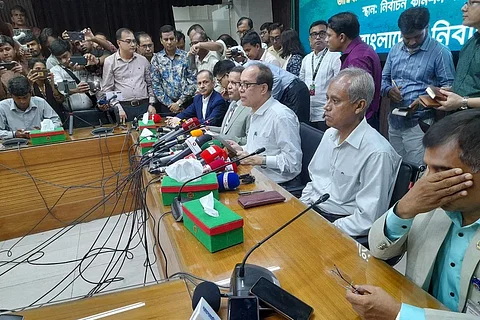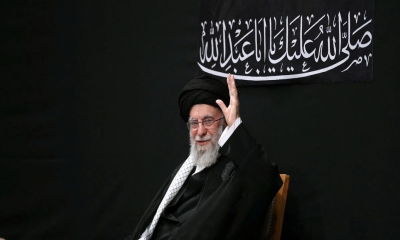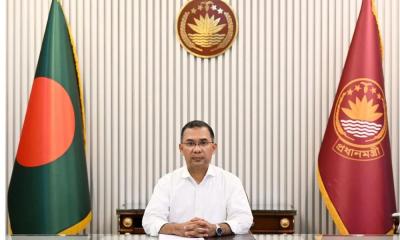Chief Election Commissioner (CEC) Kazi Habibul Awal and four other election commissioners (ECs) have resigned on Thursday.
The four ECs who resigned are Brig Gen (retd) Ahsan Habib Khan, Begum Rashida Sultana, Mohammad Alamgir, and Anisur Rahman.
Habibul Awal made the announcement this afternoon during a press briefing at the Election Commission Secretariat`s media center.
He stated, "The resignation letters will be sent to the President through the Election Commission Secretary."
He also hoped that the student uprising`s goal of creating a better Bangladesh through reforms would soon be achieved, leading to significant improvements in administration, justice, and the election system. Additionally, he thanked journalists for their support in carrying out election duties in the past.
Although appointed for a five-year term as per the constitution, the Kazi Habibul Awal-led commission resigned after just two and a half years, having assumed office on February 27, 2022.
According to media reports, they plan to meet with the president following the press conference.
During the briefing, Awal reflected on the commission`s tenure, which was marked by various electoral challenges and the complexities of managing elections in a politically charged environment.
He pointed out that Bangladesh`s electoral history has always been contentious, citing disputes even during the first constitutional general election in 1973.
Awal also mentioned that the 2008 election, held under a military-backed caretaker government, stirred controversy. The BNP won just 27 seats, while the Awami League secured 230. He noted that negotiations between the BNP, Awami League, and the caretaker government for a "safe exit" highlighted the contentious nature of that period.
Awal said that more recent elections, such as those in 2014, 2018, and 2024, were conducted under party-based governments in accordance with the constitution. He particularly noted the 2024 election, which saw major opposition parties, including the BNP, boycott the polls.
Awal stressed that the commission had no constitutional basis to suspend or cancel the elections, despite accusations of bias. He highlighted various measures the commission had implemented to maintain electoral integrity, such as distributing ballots during the day and using video monitoring during by-elections.
He acknowledged the challenges of ensuring free and fair elections in Bangladesh, where electoral disputes often fall solely on the commission. However, he also pointed out that previous commissions had been similarly criticized as biased or dishonest.
Awal concluded by calling for fundamental reforms, including changes to the electoral process, political culture, and candidate behavior. He suggested measures like proportional representation-based elections, multi-phase voting, and elections under non-partisan caretaker governments to ensure fairness and transparency.











-20260305071113.webp)



-20260304091720.webp)






-20260303080739.webp)














-20260228064648.jpg)
